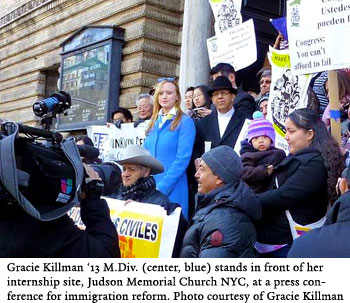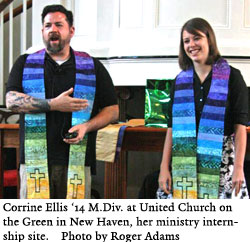“There isn’t a part of life that justice doesn’t touch.”
Gracie Killman ‘13 M.Div. has long recognized the complex interplay between issues of class, race, gender, sexual orientation, and other sites of injustice. Now, thanks to a YDS pilot course, Killman sees the myriad possibilities for students who feel called to justice-making in their academic and professional lives. “There are justice opportunities in any vocation; it’s just a matter of discerning those opportunities and making the choice to commit oneself to that opportunity.”
 Last fall Killman, along with 15 other students, enrolled in “Social Justice: Christian Community Ethics,” a pilot course that included a seminar in Christian social ethics and a justice-focused ministry internship. The class spanned two semesters and was co-instructed by Director of Supervised Ministry Lucinda Huffaker, Margaret Farley Associate Professor of Social Ethics Willis Jenkins, and Kyle Pedersen ’02 M.A.R., director of the Connecticut Mental Health Center Foundation and deacon in the Episcopal Church.
Last fall Killman, along with 15 other students, enrolled in “Social Justice: Christian Community Ethics,” a pilot course that included a seminar in Christian social ethics and a justice-focused ministry internship. The class spanned two semesters and was co-instructed by Director of Supervised Ministry Lucinda Huffaker, Margaret Farley Associate Professor of Social Ethics Willis Jenkins, and Kyle Pedersen ’02 M.A.R., director of the Connecticut Mental Health Center Foundation and deacon in the Episcopal Church.
Jenkins recalls that this yearlong course emerged from a recent “convergence of interests around the school—I was trying to create different classes around global and local social justice.” At the same time, Huffaker joined the staff with a goal of broadening justice-based internship opportunities and linking contextual education with coursework. Meanwhile, YDS students were looking for institutional support for nonprofit and advocacy-based vocational discernment, including courses that actively engaged community concerns.
“Students were wondering, ‘How do you do social justice work?’” Huffaker recalled.
Together, Huffaker, Jenkins, and Pedersen created a syllabus that incorporated traditional Christian social ethics with interdisciplinary subject units, including topics on economic justice, violence and crime, oppression and vulnerability, and the New Haven context. Once a week, students met to discuss course readings and pose questions raised by their internship sites, which included congregational settings, social service providers, and the Yale University Chaplain’s Office. Students also attended weekly practicum meetings in smaller groups led by Huffaker and Pedersen, which functioned along the lines of a professional cohort group.
Despite this dual focus, “We were trying to get away from ‘applied knowledge’ [vs. academic knowledge], and aim for a true integrative model,” said Pedersen.
Jenkins added that course aimed to create a space “where reflections on internships and pastoral practice happen alongside theological and social analyses” of injustice. Ideally, students should leave asking, “What disturbs me? What questions do I have? What relationships do I need to assemble?”
 For many students, inquiry began with their church or organizational setting. A focus on local political and socioeconomic history provided Dana Capasso ’14 M.Div. with a framework for her internship at Columbus House, which offers services for homeless men, women, and children. “When we read about New Haven, that was helpful for putting everything in context…it let me understand the need for Columbus House, its purpose.”
For many students, inquiry began with their church or organizational setting. A focus on local political and socioeconomic history provided Dana Capasso ’14 M.Div. with a framework for her internship at Columbus House, which offers services for homeless men, women, and children. “When we read about New Haven, that was helpful for putting everything in context…it let me understand the need for Columbus House, its purpose.”
At the same time, Capasso appreciated the diversity of experiences in the class, and the broader view their interactions afforded her. “Being in conversation with people in different internships reminded me that if you’re doing justice somewhere and you’re forgetting about injustice elsewhere, then you’re missing the point…it would have been very easy for me to think that homelessness is the only issue we need to care about.”
In addition to providing different perspectives on social justice, as the year progressed the class discussions and practicum shaped a learning community where, as Jenkins described it, “students helped each other interpret their experiences” and encouraged each other in their work and reflections.
Joel Bergeland ’14 M.Div. pointed to the collective nature of the course as a distinctive feature: “I value that community of accountability and challenge—it’s nice to have people who are going through this with you.”
Bergeland, who served as a dual intern at Yale student ministry center Luther House and at Resurrection Lutheran Church, also appreciated the course’s ability to hold the whole person up for reflection. “The class was holistic—it helped me frame the issues in a way that says, I am involved, all of me is involved, and the way that I understand myself and God and the world all hang together and are part of this.”
With an emphasis on both personal and structural aspects of injustice—unusual for social ethics—the course encouraged students to locate themselves and their discernment processes within the broader conversations about systems of violence, exclusion, and oppression. As an intern at United Church on the Green, Corinne Ellis ’14 M.Div. wrestled with how she might combat injustice as a pastor. Looking back, Ellis believes she has amassed “a lot of resources and a lot more energy behind a justice-oriented ministry, and knowing that will be a priority, and also figuring out my skill set. I’ve figured out I’m good at planning programs, I’m not so good at being an activist, and this class has helped me clarify those roles, and understand how [programmatic work] can be justice-making, too.”
 Students like Ashley Makar ’13 M.Div. are wrestling with new questions and new ministerial possibilities: “It’s been the kind of integration of academics and practical ministry work that I’ve been wanting the whole time I’ve been here,” she explained. Makar, who interned at Integrated Refugee and Immigrant Services (IRIS), spent time considering how religious commitments function in a secular environment: “What are the theological-ethical dimensions of non-profit work that’s not faith-based?”
Students like Ashley Makar ’13 M.Div. are wrestling with new questions and new ministerial possibilities: “It’s been the kind of integration of academics and practical ministry work that I’ve been wanting the whole time I’ve been here,” she explained. Makar, who interned at Integrated Refugee and Immigrant Services (IRIS), spent time considering how religious commitments function in a secular environment: “What are the theological-ethical dimensions of non-profit work that’s not faith-based?”
After graduating in May, Makar hopes to continue working with IRIS, expanding the resources and community building that grew out of her internship responsibilities. Makar, who is also a writer, explained: “I’ve seen a tension of commitment between a vocation in writing and a vocation in ministry—nonprofit work. And this experience has put me in a place where I’m ready to try to integrate those more…I’ve applied for a fellowship to do a project that would involve doing a refugee cooking group using Connecticut food bank food, but having storytelling around a table be an important dimension of that.”
YDS has recently seen other fruits of the social justice class, including a presentation on homelessness and stories in conjunction with the ISM, and initial conversations about a workshop on non-violent communication, originated by two students and sponsored by the Office of Supervised Ministry.
According to Pedersen, this realization about the intersection of talents, passions, principles and belief with questions of justice marks a success in terms of course objectives: “What we created in [class and practicum] was a sacred space where we could rehearse things, try on leadership roles, ethical commitments, spiritual practices—that was exciting.”
Though Jenkins will be leaving YDS this fall to accept a position at the University of Virginia, Huffaker promised “Social Justice: Christian Community Ethics” represents a beginning for education that integrates the academy, the church, and the world, and that serves students considering vocations in any or all of these areas. “We are committed to this kind of learning,” she emphasized.
| Attachment | Size |
|---|---|
| 5.95 KB |